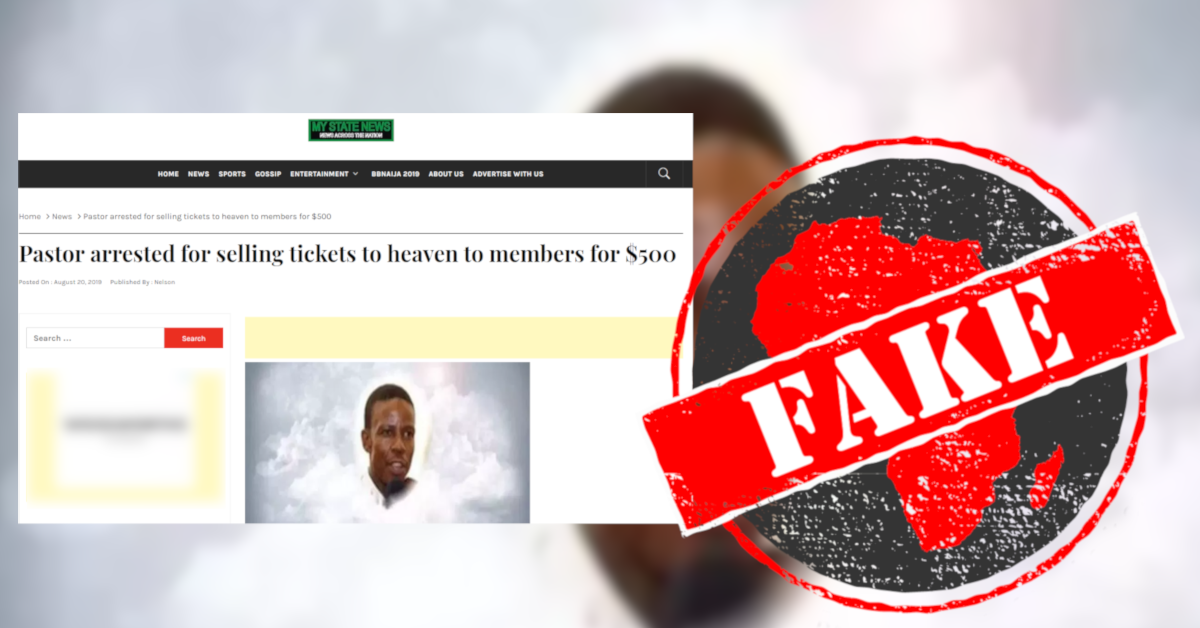Nigerian website My State News claims a Zimbabwean pastor named Tito Watts was arrested for selling US$500 “tickets to heaven” to members of his church.
The article, published on 5 August 2019, includes a photo of the pastor. It says that “according to Egypt Today”, he and his wife Amanda Watts “scammed several people into buying the tickets for $500 (N181,000)”.
The story was also posted on the Kenyan websites Standard Digital and Tuko, using the same photo but giving the pastor’s name as “Tito Wats”.

A reverse image search reveals that the photo is actually of Paseka Motsoeneng, also known as Prophet Mboro, a controversial televangelist and founder of the Incredible Happenings Ministries in South Africa.
In 2016 reports surfaced that Motsoeneng had claimed to have gone to heaven and taken selfies there. There are no reports that he has been arrested for selling tickets to heaven.
And the “Tito Watts” tale can be traced to the US.
In April 2015, fact-checking site Snopes debunked a story that “Tito and Amanda Watts” had been arrested in the US state of Florida for selling tickets to heaven.
This version used a different photo of the man, and did not claim he was a pastor.
The story was posted on a website called Stuppid. The site has a “disclaimer that advises readers that the site publishes the ‘stupidest, craziest stuff we can find’... typically made up by them,” said Snopes.
“The photograph of ‘Tito Watts’ that accompanied the original article was an unrelated 2011 image taken from a collection of bizarre police mugshots.”
Over the years, the photo has changed but the name stayed the same. Whatever the version, the story is fake. – Grace Gichuhi
The article, published on 5 August 2019, includes a photo of the pastor. It says that “according to Egypt Today”, he and his wife Amanda Watts “scammed several people into buying the tickets for $500 (N181,000)”.
The story was also posted on the Kenyan websites Standard Digital and Tuko, using the same photo but giving the pastor’s name as “Tito Wats”.

Photo of South African pastor
A reverse image search reveals that the photo is actually of Paseka Motsoeneng, also known as Prophet Mboro, a controversial televangelist and founder of the Incredible Happenings Ministries in South Africa.
In 2016 reports surfaced that Motsoeneng had claimed to have gone to heaven and taken selfies there. There are no reports that he has been arrested for selling tickets to heaven.
‘Florida man arrested’
And the “Tito Watts” tale can be traced to the US.
In April 2015, fact-checking site Snopes debunked a story that “Tito and Amanda Watts” had been arrested in the US state of Florida for selling tickets to heaven.
This version used a different photo of the man, and did not claim he was a pastor.
The story was posted on a website called Stuppid. The site has a “disclaimer that advises readers that the site publishes the ‘stupidest, craziest stuff we can find’... typically made up by them,” said Snopes.
“The photograph of ‘Tito Watts’ that accompanied the original article was an unrelated 2011 image taken from a collection of bizarre police mugshots.”
Over the years, the photo has changed but the name stayed the same. Whatever the version, the story is fake. – Grace Gichuhi
Republish our content for free
For publishers: what to do if your post is rated false
A fact-checker has rated your Facebook or Instagram post as “false”, “altered”, “partly false” or “missing context”. This could have serious consequences. What do you do?
Click on our guide for the steps you should follow.
Publishers guideAfrica Check teams up with Facebook
Africa Check is a partner in Meta's third-party fact-checking programme to help stop the spread of false information on social media.
The content we rate as “false” will be downgraded on Facebook and Instagram. This means fewer people will see it.
You can also help identify false information on Facebook. This guide explains how.


Add new comment